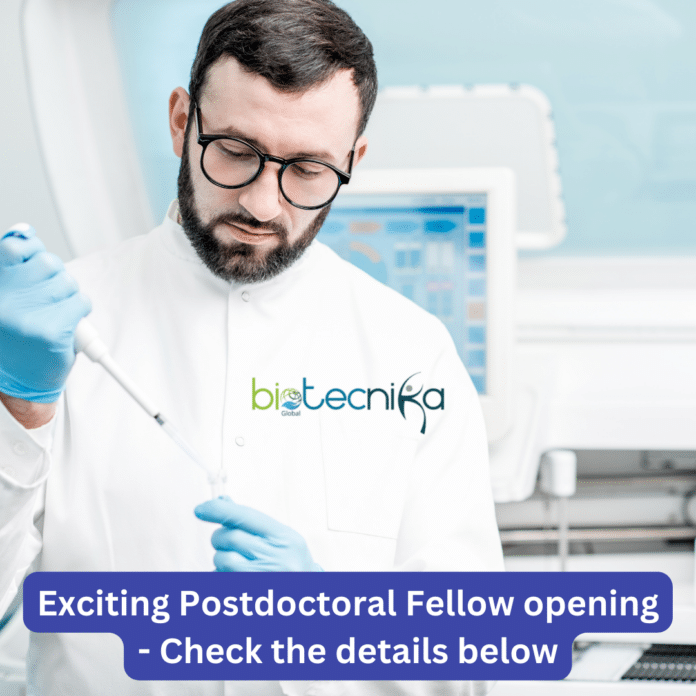PDF Immunology and Microbiology job opening. Please see the details below. Latest Postdoctoral Fellow Opening at The University of Texas. Apply now.
Posting Number – SRGV7003
Working Title – Postdoctoral Fellow (Immunology and Microbiology)
Number of Vacancies – 1
Location – McAllen, Texas
Department – School of Medicine / Immunology and Microbiology
FTE – 1.0
Scope of Job
Trainee position to pursue research as a vital component of their educational mission and professional career development. Works under minimal supervision with some latitude in the use of initiative and independent judgment in research and/or teaching. Performs teaching and/or research work as required within the classroom and/or project assigned.
Description of Duties
The following is a listing of typical duties that may be applicable to the position:
- Investigate the possible correlation between the human microbiome and cancer
- Determine the association between the human microbiome and cancer risk with a particular focus on cancers of the liver, pancreas and renal
- Develop methods for the collection, storage, and processing of samples and data for the study of the human microbiome.
Other job duties include:
1. Design and execute experiments to investigate microbiome in cancer and key mechanisms underlying cancer development, progression, and therapy response.
2. Analyze experimental data using advanced techniques and tools, generating insights that drive the project’s direction.
3. Collaborate with fellow researchers to share knowledge.
4. Troubleshoot challenges, and contribute to a collaborative research environment.
5. Contribute to manuscript preparation, presenting research findings at conferences, and engaging with the scientific community.
6. Stay updated with the latest advancements in cancer research to integrate novel concepts into the projects.
Required Education – Doctoral degree from an accredited University (based on funding restrictions degree may need to have been conferred within a set period of time previous to assuming position).
Preferred Experience for Latest Postdoctoral Fellow Opening- Demonstrated experience in conducting independent research projects. Proficiency in a wide range of laboratory techniques, including mammalian cell culture, plasmid isolation, experience working with mice models, Microbial culture, flowcytometry, molecular biology, proteomics, genomics, and cellular imaging. Preferred experience with advanced equipment such as Illumina MiSeq system and techniques such as single-cell analysis is highly desirable.
Equipment – Use of personal computer and proficiency in software and research statistical applications.
Working Conditions – Needs to be able to successfully perform all required duties. Standard office environment.
Other – This is a trainee position subject to a specific time as agreed to by stakeholders.
Employment Category – Full-Time
Hello there, everyone! We’re here to assist you in getting ready for your upcoming interview by providing you with a set of commonly asked interview questions along with their answers. Take advantage of this valuable resource to boost your preparedness and shine during your interview for the Latest Postdoctoral Fellow Opening. Best of luck to all of you!
Question 1: Can you describe your research experience and how it relates to investigating the correlation between the human microbiome and cancer?
Answer 1: Certainly. I have a strong background in immunology and microbiology, which has prepared me for this research. During my doctoral studies, I conducted research focused on the human microbiome and its interactions with the immune system. I have experience in designing and executing experiments to study microbiome composition, its impact on host health, and the potential link to diseases, including cancer. My previous work provides a solid foundation for investigating the microbiome-cancer correlation.
Question 2: What specific laboratory techniques and equipment are you proficient in, and how would you apply them to this research project?
Answer 2: I have proficiency in a wide range of laboratory techniques, including mammalian cell culture, molecular biology, flow cytometry, microbial culture, and cellular imaging. I also have experience working with mice models. For this project, I would utilize these skills to design and execute experiments, analyze data, and investigate the microbiome’s role in cancer development. Additionally, I have experience with advanced equipment such as the Illumina MiSeq system, which could be valuable for studying microbiome composition.
Question 3: Can you provide an example of a research project you’ve worked on independently, including the methods you used and the outcomes?
Answer 3: Certainly. In a previous research project, I investigated the gut microbiome’s influence on inflammatory bowel disease (IBD). I designed and conducted experiments involving microbial DNA sequencing, fecal sample collection, and data analysis. The outcomes of this research revealed specific microbial signatures associated with IBD severity, which contributed to our understanding of disease mechanisms. This experience demonstrates my ability to conduct independent research and analyze complex data.
Question 4: Collaboration is often essential in research. Can you describe your experience working with fellow researchers and your approach to fostering a collaborative research environment?
Answer 4: Collaboration is a key aspect of successful research. I have a track record of collaborating with fellow researchers by sharing knowledge, troubleshooting challenges, and contributing to a collaborative research environment. I believe in open communication, sharing ideas, and respecting diverse perspectives. I find that collaborative efforts lead to more comprehensive and impactful research outcomes.
Question 5: How do you stay updated with the latest advancements in cancer research, and how would you integrate novel concepts into your projects?
Answer 5: Staying updated with the latest advancements is crucial in research. I regularly read scientific journals, attend conferences, and participate in workshops and webinars related to cancer research. I actively engage with the scientific community to gain insights into emerging concepts and techniques. When I encounter novel concepts, I evaluate their relevance to my projects and, if applicable, integrate them into my research to enhance its depth and innovation.



